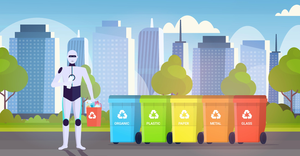The Secret to San Francisco’s Zero Waste Success
Is there a secret in San Francisco related to their zero waste success?
Yes, I think there is, and unfortunately it is rarely discussed.
I love San Francisco and the zero waste work they are doing. And I want to draw attention to what their “secret ingredient” is so that other cities can better understand what they don’t have but might want to pursue locally, even if in an altered form.
Last month, the New York Times wrote another admiring piece about the San Francisco zero waste program. And again, the reporter missed asking the logical question, “Why San Francisco?” What is different about Golden Gate City that makes it such a star when it comes to progressive waste management systems?
It isn’t a unique technology, as Jack Macy even admits in the article. That is an important point considering all the sketchy “new tech, one-bin” proposals we’ve been seeing lately as the way to achieve zero waste.
There is more than just one reason that San Francisco is successful. But I am going to focus on the one thing that is really special, and it’s the relationship between the San Francisco government and the private sector service provider Recology. The working relationship between these two entities is very unique and I think is the key to enabling their soaring success. So why are they such good buddies in pursuit of a common goal when elsewhere we see conflict and struggle, such as the recent Houston-Waste Management Inc. contract tussle?
I didn’t want to misspeak here, so I ran this column past a San Francisco insider to make sure I got this right. The company known today as Recology is, in fact, a very old company with deep roots in the San Francisco waste business dating to the early 1920s. They did something unique and remarkable many years ago. Two Recology predecessor haulers, Scavenger's Protective Association and Sunset Scavenger Company, got written into the City Charter through a voter initiative ordinance as the exclusive official refuse haulers for the entire city. These exclusive refuse collection licenses could be overturned by the voters, but as long as voters were happy with the deal, it was forever. In Italy, this is called an “inside company” and is actually accepted as an option for providing public service. No surprise then that the original Recology was started by an Italian family.
This has created a sweet deal for Recology and they knew it. When the city staff approached the company in the 1990s and told them San Francisco wanted to become a zero waste city, Recology was in a good position to either fight the effort or join it. I don’t know what was said exactly. But I do remember having a personal discussion with a Recology manager back in the 90s. (When they were called Norcal.) This manager told me that the behind-the-curtain informal agreement was that the city would share the risk of this new zero waste path for long enough for Recology to learn how to transform their existing business model based upon primarily landfilling into a business plan that was based upon landfill diversion. By sharing the risk, the Recology would still be making profits during the transition. This sounded fair to me at the time, and it has proven to be a wise move.
But the remarkable part that I want to highlight here is that this sort of cooperation and planning between government and the private sector rarely happens in America. I think it must be due to Recology’s legally-protected status of being written into the City Charter that enables them to have a unique power within the relationship that can be used in partnership with the city to achieve community benefit and ensure a certain level of private sector profit.
I think this close relationship is similar to how my town “coordinates and plans the future” with our electric utility provider. This “public utility monopoly” approach for electricity exists in nearly every town in America.
So in some ways this special relationship that San Francisco and Recology have isn’t that unique. It’s just that other cities don’t use the public utility approach in the waste management industry. I think we should start doing so!
I don’t think the San Francisco City Charter approach is replicable across the entire country for many reasons. But I do think that many of the working elements that make their approach successful are replicable. At its core, the San Francisco zero waste program is run like a social enterprise, meaning that its primary purpose for being is to fulfill a mission (i.e. zero waste) and that the program is expected to make a profit while doing so. I know a lot about this approach since I created the nation’s largest nonprofit zero waste social enterprise here in Boulder, Colo., where our partnership success with the city came not from a legal protection like Recology’s, but from a civic mandate delivered to the city by a citizens army organized by Eco-Cycle.
This “double bottom-line (DBL) approach” to creating value for the community is an exciting new way of using the power of the marketplace in partnership with local government. The place to watch to see how far it can go is the U.K. right now, especially Scotland. We are watching new “legal vehicles” for the creation of DBL enterprises emerge with names such as “the CIC” (community interest company), or the “B” Corp (the for-benefit corporation), and my favorite, the “the L3C” (low-profit limited liability company LLC).
In the last few years we’ve heard the giants of industry, like Bill Gates and others, call for a more “compassionate capitalism.” The reason this topic is up for discussion is because there is a growing recognition that the current form of free market capitalism isn’t capable of addressing the serious social and environmental problems of our times. On top of that, our local, state and national government entities can’t do it either as their funding and public support is shrinking.
I say don’t mess with the existing single bottom-line capitalism—it has brought us Apple and Amazon—but that it is time for a new addition to the national economic operating system which I’ll call Capitalism 2.0, (as in two bottom lines), and that there are special needs in our world today, like clean energy and zero waste, that need a new marketplace approach that combines the leadership of government with the horsepower of business.
When more cities step forward and support the social enterprise approach, then maybe San Francisco won’t stand so alone as a national star in the race to zero waste.
About the Author
You May Also Like


